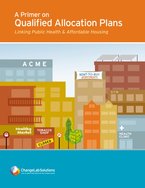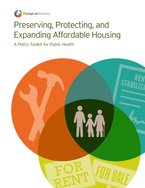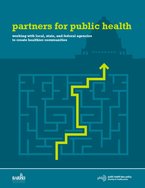Found 61 resources.
0
0
0
This report is intended to help public health advocates and policymakers formulate input into the QAP process, with the objective of developing healthier homes. We describe the rationale for including a wide range of public health-related criteria in QAPs, identify and describe QAP criteria that can have a positive impact on public health, and suggest how public health advocates can get involved in revising their state QAPs.
Topics: Exercise, Funding, Health, Legislation & Policy, Low-income, Place-based, Safety, Smoke-free
 Shared by Housing Is
on Jul 13, 2018
Shared by Housing Is
on Jul 13, 2018 0
0
0
Practitioners and community advocates working at the intersection of housing and health have a unique role to play, both in guaranteeing quality affordable housing remains available for people of all incomes, and in making sure new investments in neighborhoods contribute to a healthy environment. To support those efforts, this guide includes the following: An overview of how renewed interest in urban centers is affecting housing affordability; A summary of the research linking rising housing costs to poor health outcomes; A set of key recommendations communities should consider as part of an...
Topics: Funding, Health, Homelessness, Housing, Legislation & Policy, Low-income, RAD, Safety
 Shared by Housing Is
on Jul 13, 2018
Shared by Housing Is
on Jul 13, 2018 0
0
0
This guide is intended to provide information to public health department staff and advocates about the many public agencies that make policy decisions and implement projects related to the physical environment.
Topics: Child welfare, Community development, Education, Exercise, Green, Health, Housing, Legislation & Policy, Place-based, Safety, Smoke-free, Stability, Substance abuse, West Coast
 Shared by Housing Is
on Jul 13, 2018
Shared by Housing Is
on Jul 13, 2018 0
0
0
The Trauma Informed Community Building (TICB) model is based on BRIDGE Housing Corporation’s experience doing community building work over the past five years in the Potrero Terrace and Annex public housing sites in San Francisco, CA.
Topics: Child welfare, Community development, Dual-generation, Family engagement, Low-income, Mental health, Partnerships, Place-based, Preventative care, Research, Safety
 Shared by Housing Is
on Jul 12, 2018
Shared by Housing Is
on Jul 12, 2018 0
0
0
Reducing Pediatric Asthma through Home Improvements and Education
Topics: Asthma, Child welfare, Community development, Cost effectiveness, Data sharing, Early childhood, Education, Family engagement, Health, Healthy homes, Housing, Low-income, Medicaid / Medicare, Metrics, Partnerships, Place-based, Preventative care, Research, Safety
 Shared by Housing Is
on Jul 10, 2018
Shared by Housing Is
on Jul 10, 2018 0
0
0
Topics: Child welfare, Criminal justice, Domestic violence, East Coast, Family engagement, Housing, Legislation & Policy, Low-income, Research, Safety, Supportive housing, Youth
 Shared by Housing Is
on Jul 10, 2018
Shared by Housing Is
on Jul 10, 2018 0
0
0
In a new three-part video series, the American Council for an Energy-Efficient Economy explores how energy efficiency can improve people’s health. We hear the stories of homeowners in three states. To look at efficiency’s impact in rural areas, Part One takes us to McDowell County, West Virginia.
Topics: Asthma, Energy, Green, Health, Healthy homes, Housing, Place-based, Safety, Seniors, Sustainability
 Shared by Housing Is
on Jul 5, 2018
Shared by Housing Is
on Jul 5, 2018 0
0
0
Topics: Child welfare, Early childhood, Education, Mental health, Post-secondary, Research, Safety, South, Youth
 Shared by Housing Is
on Jul 5, 2018
Shared by Housing Is
on Jul 5, 2018 0
0
0
Chicago’s troubling homicide rate could be significantly reduced through a massive increase in state spending for Chicago schools.
Topics: Child welfare, Community development, Cost effectiveness, Education, Funding, Legislation & Policy, Low-income, Midwest, Research, Safety, Youth
 Shared by Housing Is
on Jul 5, 2018
Shared by Housing Is
on Jul 5, 2018 0
0
0
A Nashville elementary school takes a comprehensive approach to trauma-informed practices, creating a space where students feel known and supported.
Topics: Child welfare, Depression, Domestic violence, Education, Low-income, Mental health, Safety, Youth
 Shared by Housing Is
on Jul 5, 2018
Shared by Housing Is
on Jul 5, 2018 0
0
0

Why do some neighborhoods appear able to launch effective local improvement initiatives, while others are more hampered by fragmentation and mistrust? Why can some communities mobilize diverse constituencies to influence public policy, while others cannot? Answers to these questions may be found in the specific patterns of collaboration that form among community organizations, and between these groups, schools, public agencies, and elected officials, according to MDRC, a preeminent social-policy research organization.
Topics: Asset building, Child welfare, Community development, Data sharing, Dual-generation, Education, Family engagement, Funding, Health, Housing, Legislation & Policy, Low-income, Metrics, Midwest, Mobility, Out-of-school time, Partnerships, Place-based, Preventative care, Research, Safety, Stability, Workforce development, Youth
- « first
- ‹ previous
- 1
- 2
- 3





